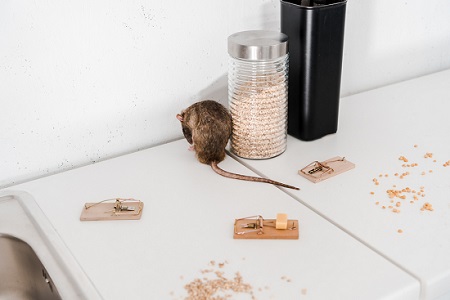
Once the winter season arrives, there are some pests that look in our homes for food sources and warmth. According to the pest management association, homeowners should take various pest control methods against the most common ones that appear during winter like rats, mice, cockroaches, racoons, and spiders.
Winter Pest Control Tips To Prevent An Infestation
House Mice
The house mice are by far the most common rodent in the United States. House mice nest in secluded and dark areas such as basements and attics. This rodent could result in major property damage by chewing through wires and drywall. House mice are known to contaminate food and cause health problems like tapeworms and Salmonella.
Rodents could fit in tiny openings so be sure to seal holes and cracks on the outside of your home using steel wool or caulk. Areas must be clear and boxes must be stored off the floor since these pests could hide in the clutter. Inspect your home regularly for signs of mice infestation such as gnaw marks, droppings, and damaged food.
Norway Rats
Norway rats usually nest in piles of debris, basements, as well as other undistributed materials. They’re known to eat through nearly everything like lead pipes and plastic to get water and food. Norway rats are likewise the vector of several diseases such as ratbite fever, jaundice, and cowpox virus.
Norway rats could fit through a gap that’s as small as ½ inch or the size of a quarter. Check the outside of your house for any cracks or openings and then fill them with silicone caulk. Get rid of moisture sources in the basement and crawl spaces. Inspect the inside of your house regularly for possible signs of pest infestation like gruby rub marks that are caused by the oily fur of the rat.
German Cockroaches
German cockroaches are the most common species of cockroaches found throughout the entire world. They love to reside in tiny areas near food and moisture so human houses are their perfect habitat. This kind of cockroach usually hitchhikes indoors like grocery bags, boxes, as well as second hand appliances. They are also found in bathrooms and kitchens. German cockroaches could also contaminate food sources as well as spread bacteria as well as human pathogens. Additionally, cockroaches are known to cause allergies and worsen asthma symptoms, especially among kids.
Always make sure that the floors and counters are free of crumbs and clean. You should vacuum on a regular basis and get rid of garbage. Focus on the bathrooms and kitchens including those under sinks and appliances.
Brown Recluse Spiders
Brown recluse spiders love to spin webs in places like attics, closets, basements, and crawl spaces. Just like other kinds of spiders, the brown recluse is usually discovered inside cardboard boxes along shoes and clothing that are rarely used as well as window moldings. These spiders bite and inject venom that could be dangerous to the health of humans.
Raccoons
Raccoons are found in the country’s wooded eastern area. This kind of wild animal enters houses through chimneys and attics trying to look for a denning site. Racoons are one of the major hosts of rabies in the country.
Your trashcans and recycling bins must be placed in areas like an outhouse and locked shed. In case the trashcan is kept outdoors, make sure that you use lids that are animal-proof. Check the outside of your house for access points like a broken vent cover. Fix any loose shingles and sidings. You should also consider the installation of a cap or mesh cover over chimneys as well as other exposed openings to prevent entry. Additionally, always keep nearby tree branches trimmed back from your home.
Call Zap Pest Control Inc. if you need the help of a professional pest control in Myrtle Beach company to get rid of the infestation in your house.
Like our Facebook page for more great info about pest control services.
Zap Pest Control Inc.
2507 Forestbrook Rd Suite G
Myrtle Beach, SC 29588
843-654-1927
http://zappests.net/

No comments:
Post a Comment